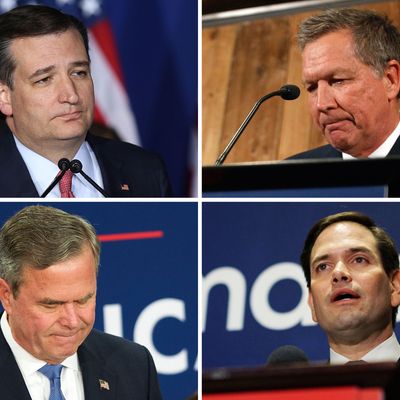
Last night, in a tedious, anticlimactic, and not very close vote, the Republican Rules Committee quashed the final vestiges of the revolt against Donald Trump. The selection of Mike Pence as vice-president has also semi-formalized the assimilation of anti-Trump Republican elites into a unified Trumpist party. Watching the #NeverTrump movement breathe its last breath provides a fitting final insight into the reason it failed.
Republicans who have refused to back Trump deserve real credit for having either the recognition or courage to arrive at a conclusion that their fellow Republicans could or would not — that Trump is unfit as a human being to hold executive office in a great democracy. This morning, Trump taunted his vanquished foes.
Some #NeverTrumpers have firmly held to their position that Trump’s defeat remains paramount:
But, on the whole, the #NeverTrumpers have largely failed to have the courage of their convictions. Marco Rubio is a prime example, having used the #NeverTrump slogan to try to win the primary, only to quickly turn around and admit that “never Trump” only meant never Trump as the party’s nominee. According to former Bush administration official Dan Senor, Mike Pence himself once privately deemed Trump unacceptable, only to turn around and accept a place on his ticket.
A middle ground between the two is the remaining #NeverTrumpers who nonetheless cannot quite let go of their residual loyalty. Consider these responses from #NeverTrump conservatives:
Their argument has a certain superficial logic: If Trump is trying to unify the party, why is he taunting the #NeverTrump Republicans? But, of course, the whole alleged point of #NeverTrump is that there’s nothing Trump can do to mollify them. That’s what never means. Trump has no reason to avoid giving offense to people who will never support him.
The notion that Trump isn’t helping himself by offending #NeverTrump is a bit like John Cleese’s character in Life of Brian warning the blasphemer who’s been sentenced to death by stoning, “You’re only making it worse for yourself!”
It makes sense, though, if you think of #NeverTrump as something more like a hard opening line in a negotiation that will go on through November. That sensibility can be seen as well in Erick Erickson’s anti-Trump polemic today. On the surface, Erickson, a staunch right-winger and Trump critic, remains as unreconciled as ever to Trump as a candidate, lambasting the candidate’s character and ideological bona fides. But Erickson can’t bring himself to admit whether he prefers Hillary Clinton over Trump, and his argument rests on the emergence of some other right-wing candidate to make the case against Clinton. But when such a candidate fails to come along, the #NeverTrumpers will have to decide whether they want Trump to win or not — and the latter means that Hillary Clinton wins. For all his disgust with Trump, the logic of partisanship still overrides everything.
Trump won the nomination for many reasons, the primary one being he represents the Republican base more authentically than any other candidate. But it’s not unimportant that most of the people within the party who did see Trump clearly ultimately decided they care less about keeping him from power than keeping their party together.






























